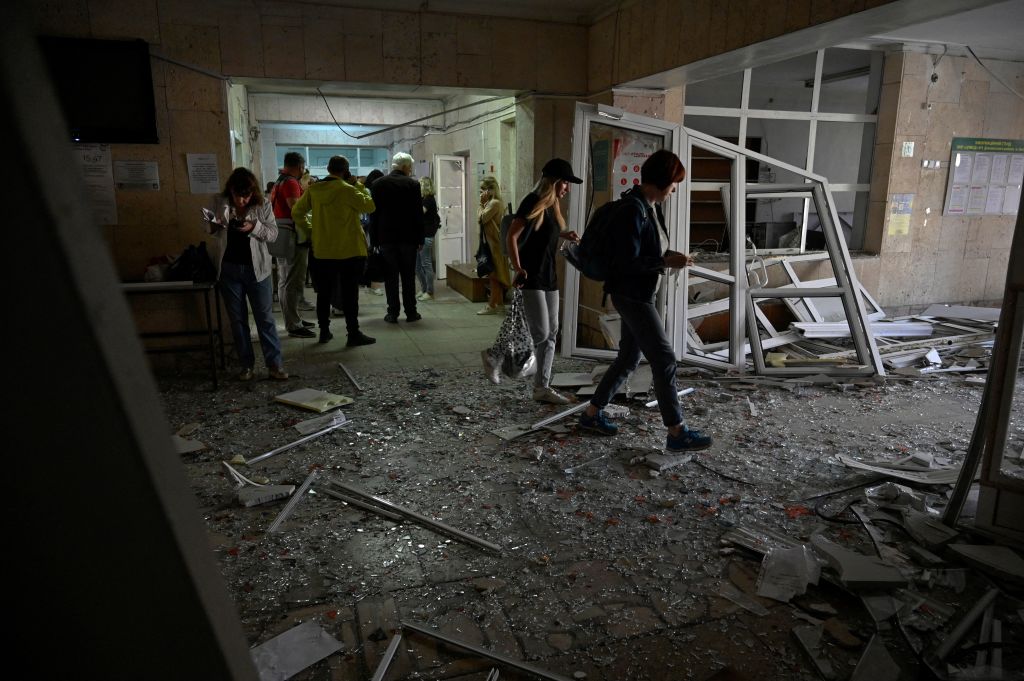Russia fired more than 576 missiles and drones against Ukraine last month; Kyiv was shelled two days in three. Ukrainian air defence works smoothly, shooting down nearly 90 per cent of missiles – but even a successful intercept can lead to debris, causing death. This happened yesterday, in a case that is causing a national scandal.
As the siren sounded over Kyiv, a man, his wife and his daughter headed with their neighbours to their shelter in Desnianskyi district – only to find it locked. The man, known as Yaroslav, ran to find someone to open it up. ‘People knocked and knocked again for a very long time. And no one [opened the door],’ he said, ‘and at that moment, the debris [of the missile] fell.’ That debris killed Yaroslav’s wife and two others, including a child. His daughter survived. This case has been given national coverage as this is a common problem in Ukraine: hundreds of bomb shelters exist only in name, or are kept locked or are unusable. It is a staggering reality for a war-torn country.
Typically, an Iskander ballistic missile fired from Russia travels at supersonic speed for about five minutes before reaching Kyiv. The alarm often sounds soon after launch, so there is not much time to take cover. Such alarms can be triggered five times a day (or night), with some lasting for hours, so those who have to work the next day decide to take their chances. This is now a daily occurrence all over Ukraine. People can end up waiting out the attack in the hallway of their flats, or hiding in rooms without windows. Officials advise that the safest place to hide is in a room with two walls away from the outside.
When people rush to a shelter with their children and pets, they expect it to be open. Vitali Klitschko, the mayor of Kyiv, yesterday blamed everyone but himself: the shelter’s security guard, the head of the shelter – in this case, a medical institution – and the head of the district. Four people were arrested. But this is not an isolated incident. Ukrainians have complained about the shelters for months and it is still unknown how many lives were lost because of such negligence.
Officially, there are 4,140 shelters in Kyiv; they are constantly being ‘inspected’. In reality, a large number are simply underground parking lots, basements in apartment blocks or underground passages. Some are marked on a map, but many don’t actually exist at all. Some ‘shelters’ look as if they will fall apart, even with no bomb; others are locked up at night (or are never open) to avoid the homeless moving in.
‘The question is not so much the availability of shelters, but the desire to go down there,’ said Mykola Povoroznyk, deputy chairman of the Kyiv City State Administration, this week. Many Ukrainians are indeed upset about having to run outside at 3 a.m. every morning, but they want to live. If there were more shelters – and all were in proper condition – more people would be keen to seek protection there. More than 350 million hryvnias (£7.5 million) have been allocated in Kyiv’s budget to carry out repair works and bring shelters into order this year, with millions more spent around the country since the 2014 invasion. A full-scale war has lasted for more than a year, but the issue is still not solved.
Only after yesterday’s scandal are the local authorities moving. The Kyiv City Council will form ten mobile groups to check the condition of the shelters and the 24-hour access to them. The Ministry of Internal Affairs has promised that rescuers and the police will regularly check bomb shelters throughout the country. Zelensky has also ordered inspections of all shelters in Kyiv to be carried out, with the reports due back in ten days. How effective these measures will be is anyone’s guess.







Comments